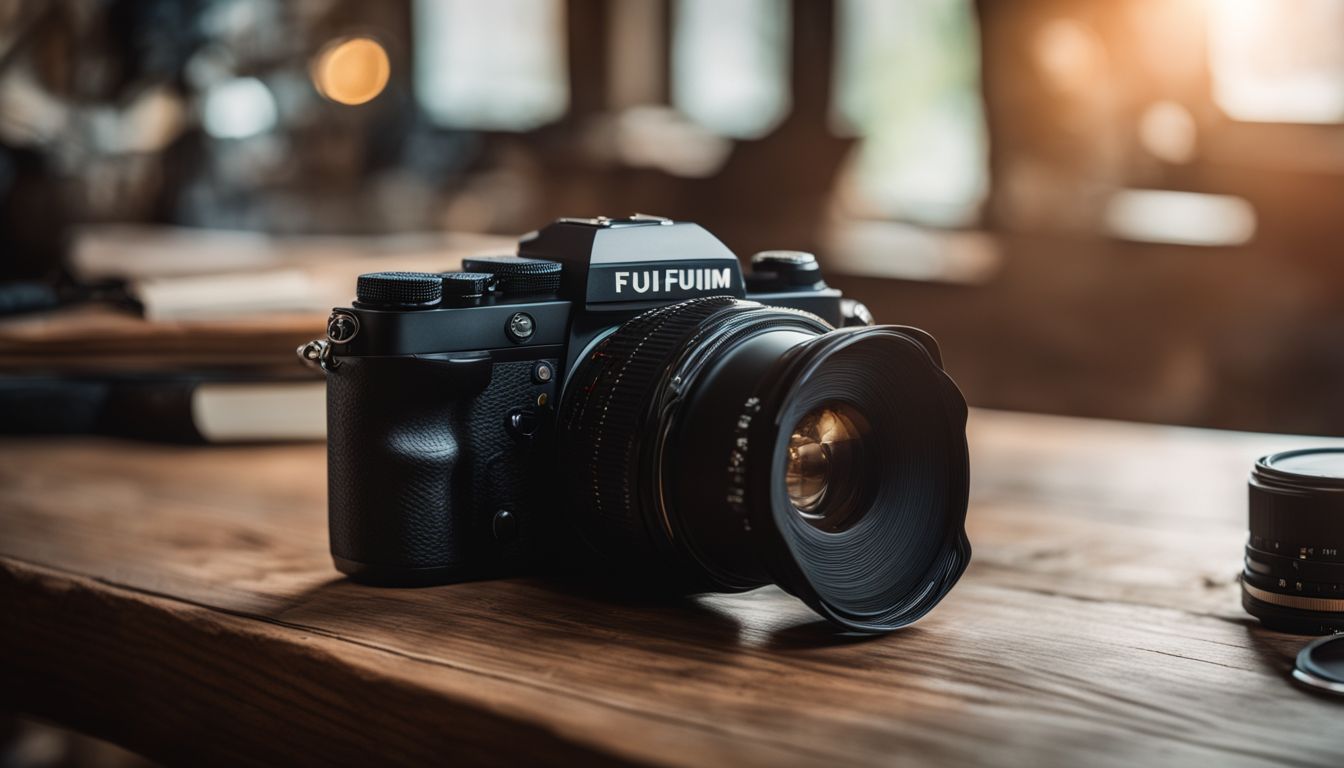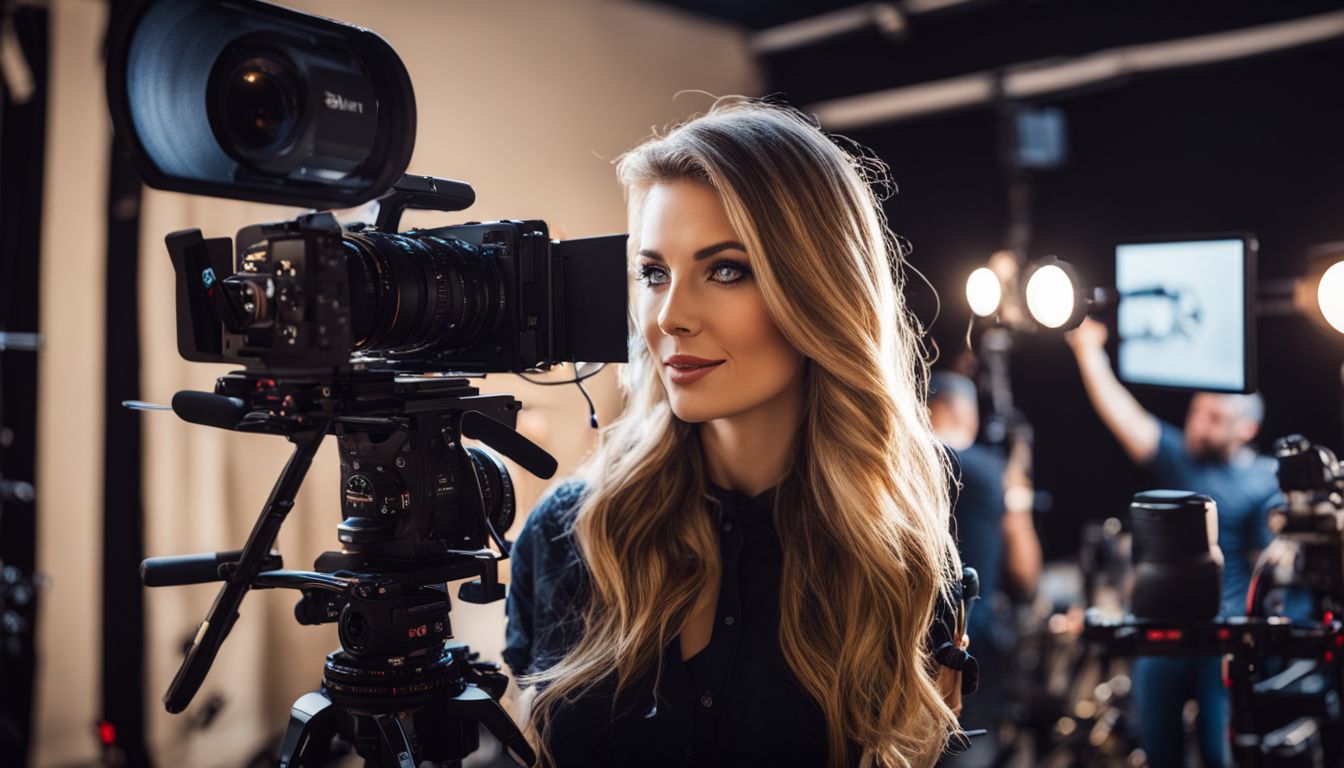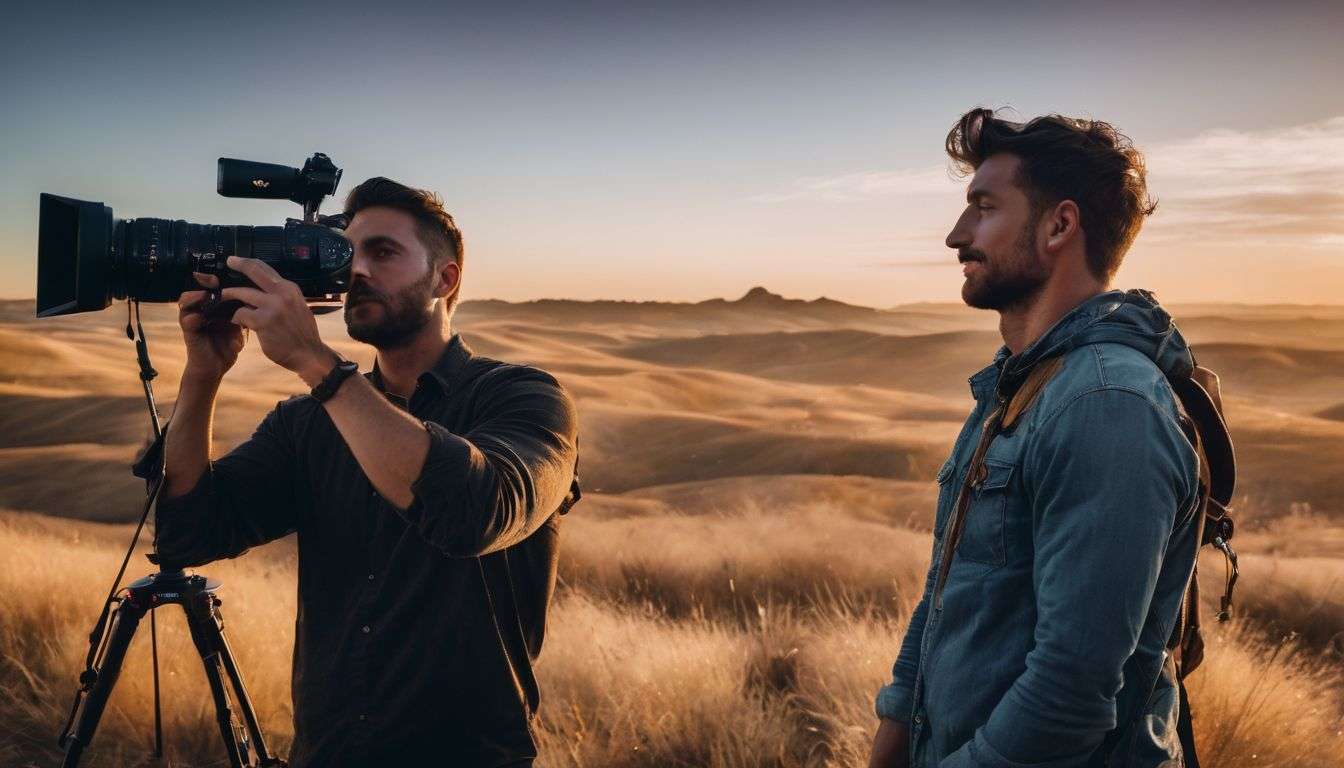Are you scratching your head trying to comprehend the difference between cinematography and videography? Believe me, you’re not alone. These terms can seem quite puzzling and easily interchangeable – it’s a notion we all held at one point, even us! But after delving deep into research and gaining first-hand experience in the field, we’ve discovered they each bear unique traits and applications.
This enlightening article is set to shine a light on their distinctions – from core definitions, job responsibilities right through to artistic direction and so much more. Are you prepared for an immersive journey into these captivating aspects of visual storytelling? Well then, let’s crack on!
Key Takeaways
- Cinematography is the art of storytelling through visually creative techniques in movies and TV shows, while videography focuses on capturing live events like weddings or conferences.
- Cinematographers have more control over camera angles, lighting, and artistic choices to create a unique visual style, whereas videographers prioritize documenting moments as they happen without much emphasis on artistic direction.
- Both cinematographers and videographers require technical skills and knowledge of equipment, but cinematographers often have higher production values and work on larger film projects compared to videographers who typically work alone or with a small team at live events.
- When deciding between hiring a cinematographer or a videographer, consider factors such as project requirements, budget constraints, desired visual style, and storytelling goals.
The Distinction between a Cinematographer and a Cameraman
 A cinematographer and a cameraman are different. Both of them capture things with a camera, but what they do is not the same. A cinematographer uses art to tell stories in films, TV shows and commercials (1).
A cinematographer and a cameraman are different. Both of them capture things with a camera, but what they do is not the same. A cinematographer uses art to tell stories in films, TV shows and commercials (1).
They have control over many visual parts like angles of the camera, lighting and setup (8). We call this filmmaking or artistic direction.
On the other hand, a cameraman does more than just recording. He captures live events such as weddings or meetings (3). This is known as videography. The job of a cameraman also includes setting up cameras and lights too.
Yet, their job is not about telling an arty story but about keeping real moments for other people to watch later on.
Differences Between Videography and Cinematography

Videography and cinematography differ in terms of their definition, purpose, primary duties, creative approach, equipment, work environment, and education.
Definition and purpose
Cinematography is the art and science of making a film. It’s all about telling a story through visual images. Cinematographers use creative techniques to capture footage for movies, TV series, and ads.
They play around with camera angles and lighting to create certain moods or effects.
On the other side, videography aims more at recording live events like weddings or conferences. Videographers document reality as it happens without much focus on artistic choices.
Their job is not just capturing moments but also preserving them for future viewing pleasure. Both jobs require skill in handling cameras, lights, and editing tools but serve different purposes.
Primary duties and responsibilities
We take on many tasks as video makers and film creators. In our line of work, the roles are not the same. Here is what we do:
- We create the look and feel of a movie or TV show.
- We decide how to use lights and cameras.
- We think about the best camera angles for each shot.
- We pick out lenses and camera movements.
- We work with directors to tell stories in a visual way.
- We record live events like weddings or concerts.
- We have to be ready to catch important moments as they happen.
- Sometimes we edit the footage into a finished product.
- Our job is also to make sure the sound and video quality is good.
- Often, we work alone or with a small team.
Creative approach and artistic direction
In movies, the look and feel matter a lot. This is where cinematographers shine. They play with light, shadow, colour and frame to tell the story in a unique way. They take risks and break rules to bring their vision to life on screen.
Videographers don’t have this much control or freedom. They work hard to capture events as they happen. Their work is about making sure nothing gets missed rather than creating a new world.
Both need an eye for detail and style but their art differs greatly because of what their job needs them to do.
Equipment and technical skills
Both video makers and film creators need to know their gear well. Tools like cameras, lights, and editing software are key for both jobs. Good filming needs the right camera angles and perfect light.
Both videographers and cinematographers must also know about editing videos. In fact, choosing the best shots to make a movie or video look great is very important. Still, there’s one big difference here: Cinematographers often have more control over visual parts of a production than videographers do! So knowing your tools is really not enough; you must also use them in an artful way to tell a captivating story with your footage.
Work environment and project types
Cinematographers and videographers work in different settings. A cinematographer works on film projects like movies, TV series, or commercials. They are part of a big team. The main goal is to tell a story through pictures and sound.
On the other hand, videographers often find jobs at live events such as weddings or corporate meetings. They may work alone or with a small crew. Their job is mainly about catching the event as it happens on video.
The type of project also helps decide if you need a filmmaker or cameraman. If your project needs high-quality visuals and deep storytelling, then you would go for a cinematographer.
But if your aim is to document an event in real-time with less focus on creative aspects, then hiring a videographer would make sense.
Education and professional development
We need to think about education and professional growth in both fields. Cinematographers often study film or media arts in school. In these courses, they learn about the art of making movies. They get to know camera angles, lighting, and more. Some also learn on the job while working on a film set.
Determining the Need for a Videographer or Cinematographer
When deciding whether to hire a videographer or cinematographer, it’s crucial to consider the project requirements, budget, and desired visual style. Find out why this decision can significantly impact the overall production value and storytelling of your project.
Read on to learn more.
Project requirements and objectives
Project requirements and objectives play a crucial role in determining whether a videographer or a cinematographer is needed.
- The type of project: Determine if the project is more focused on capturing live events, such as weddings or conferences, which may require the skills of a videographer. On the other hand, if the project involves creating narrative films, TV series, or commercial productions, it may be best suited for a cinematographer.
- Budget and resources: Consider the available budget and resources for the project. Cinematographers generally have higher production values and require more equipment and crew members compared to videographers. Assess whether the budget allows for the additional costs associated with cinematography.
- Desired visual style and storytelling: Think about the desired visual style and storytelling approach for the project. If there is a need for more creative control over framing, lighting, camera angles, and composition to enhance narrative elements, a cinematographer may be required. However, if the main goal is to document events as they happen without much emphasis on artistic choices, a videographer may be sufficient.
Budget and resources
Determining the need for a videographer or cinematographer involves considering the project’s budget and resources. Both roles require certain equipment and technical skills, but the level of investment can vary.
Cinematography often requires higher production value, which may involve more expensive cameras, lighting equipment, and post-production tools. On the other hand, videography can be more cost-effective since it focuses on capturing live events without as much emphasis on artistic direction or complex editing.
When deciding between videography and cinematography, it is important to consider what resources are available and how they align with your desired visual style and storytelling goals.
Desired visual style and storytelling
When it comes to desired visual style and storytelling, cinematography and videography can differ. Cinematographers focus on creating visually stunning and artistic shots that enhance the storytelling aspect of a film or TV series.
They have more creative control over camera angles, lighting, composition, and other cinematic techniques. On the other hand, videographers are often more concerned with capturing live events as they happen without much emphasis on creative choices.
While both require technical skills and knowledge of equipment, cinematographers have a broader scope when it comes to achieving a desired visual style and engaging storytelling in their projects.
Benefits and Limitations of Videography
Videography offers efficiency and cost-effectiveness for capturing live events such as weddings or concerts, but it is limited in terms of artistic control and production value.
Efficient and cost-effective
Videography is often considered to be more efficient and cost-effective compared to cinematography. This is because videographers typically work alone or with a small crew, which allows for faster setup and less complex production processes.
Additionally, videographers generally use less expensive equipment and have lower overall production costs. Therefore, if you’re looking to capture live events or need a simple recording of an occasion without the need for extensive artistic direction or high production value, videography may be the more practical choice that fits within your budget constraints.
Suitable for events and interviews
Videography is well-suited for events and interviews. As a videographer, our main focus is to capture live moments as they happen. We aim to document reality without interfering too much in the natural flow of things.
Whether it’s a wedding, conference, or an interview, we use our technical skills and equipment to record the event in a clear and professional manner. Our goal is to capture all the important details and emotions of the occasion so that viewers can experience them even if they weren’t there in person.
So if you’re planning an event or need someone to film your interview, videography could be the right choice for you.
Limited artistic control and production value
Videography, while efficient and cost-effective, often has limited artistic control and production value compared to cinematography. This is because videographers primarily focus on recording live events or capturing interviews, where their main goal is to document moments as they happen without much creative input.
As a result, the footage may lack the same level of artistic direction and storytelling found in cinematic projects. Additionally, videographers typically work with minimal resources and equipment, which can affect the overall production quality compared to the more extensive tools available to cinematographers.
However, it’s important to note that this limitation doesn’t diminish the value of videography in its own right—it just serves a different purpose than cinematography in terms of visual storytelling and artistic expression.
Benefits and Limitations of Cinematography
Cinematography offers opportunities for artistic expression and visual storytelling, making it particularly well-suited for narrative films and commercials.
Artistic expression and visual storytelling
Cinematography allows for artistic expression and visual storytelling through the use of various cinematic techniques. Cinematographers have the ability to create a specific look and feel for a film or commercial, using camera angles, lighting, and composition to enhance the narrative.
They work closely with directors and production designers to bring their vision to life on screen. Videography, on the other hand, focuses more on capturing live events or documenting reality as it unfolds without as much emphasis on creative choices.
While both cinematography and videography require technical skills and knowledge of equipment, cinematographers often have more creative control over the final product.
Suitable for narrative films and commercials
Cinematography is well-suited for narrative films and commercials. This is because cinematographers have the artistic skills and technical knowledge to create visually captivating stories.
They carefully choose camera angles, lighting, and composition to enhance the storytelling experience. Cinematographers work closely with directors to bring a specific vision to life on screen.
In commercials, they use their expertise to showcase products or services in an appealing and visually striking manner. With a focus on visual storytelling, cinematography adds a higher level of production value and creative collaboration to narrative films and commercials alike.
Videography also has its place in narrative films and commercials but in a different capacity. Videographers capture live events as they happen, including weddings, conferences, or concerts.
Their goal is mainly focused on recording the event rather than creating an artistic story. While videography may lack some of the artistic control found in cinematography, it offers efficient and cost-effective options for capturing real moments in real-time.
Higher production value and creative collaboration
Cinematography often involves higher production value and creative collaboration. Cinematographers have the opportunity to use cinematic techniques, camera angles, and visual composition to enhance the storytelling aspect of a film or commercial production.
They work closely with directors, producers, and other members of the creative team to create visually stunning and compelling visuals. Through their expertise in cinematography styles and techniques, they can bring a unique artistic vision to life on screen.
This collaboration allows for greater creativity and innovation in the overall production process.
Conclusion
In conclusion, cinematography and videography are two distinct but equally important aspects of filmmaking. Cinematography focuses on the creative and artistic elements of storytelling through film, while videography is more centered around capturing live events or documenting reality.
Both require technical skills and knowledge of equipment, offering rewarding career options for those interested in the world of visual storytelling. So whether you aspire to create cinematic masterpieces or capture memorable moments as they happen, understanding the differences between cinematography and videography will help you determine which path aligns better with your interests and goals.
What is the Difference Between Cinematography and Filmmaking?
Cinematography versus filmmaking explained: Cinematography and filmmaking are closely related yet distinct aspects of the film production process. Cinematography refers to the art of capturing moving images on camera, encompassing composition, lighting, and camera movements. On the other hand, filmmaking encompasses all the stages involved in creating a film, including directing, writing, editing, and production. While cinematography focuses on the technical aspects of visuals, filmmaking is a broader term that encompasses the entire storytelling process in film.
How Does Cinematography Differ from Videography in Terms of Composition and Framing Techniques?
Cinematography and videography differ significantly in terms of composition and framing techniques. While cinematography focuses on artistic elements, videography emphasizes capturing events. Composition and framing techniques in videography are essential for effectively documenting moments, while cinematography employs creative and intentional approaches for storytelling and evoking emotions. The divergent objectives make these two disciplines distinctive in capturing and presenting visual narratives.
FAQs
1. What is cinematography?
Cinematography is the art of capturing and creating visually appealing images in motion pictures, focusing on elements like lighting, composition, camera movement, and color.
2. What is videography?
Videography refers to the process of recording videos using a video camera or other electronic devices.
3. What are the main differences between cinematography and videography?
The main difference lies in their purpose and approach. Cinematography focuses on creating artistic visuals for storytelling or cinematic purposes, while videography typically involves capturing events or documenting real-life situations without much emphasis on artistic expression.
4. Do cinematographers use different equipment compared to videographers?
Cinematographers often work with professional-grade cameras and specialized equipment such as dollies, cranes, or stabilizers to achieve specific cinematic effects. Videographers may use consumer-level devices like camcorders or DSLRs for their filming needs.
5. Can someone be both a cinematographer and a videographer?
Yes, someone can have skills in both cinematography and videography as they involve similar technical aspects of capturing moving images; however, the focus and approach may vary depending on the project’s requirements.






